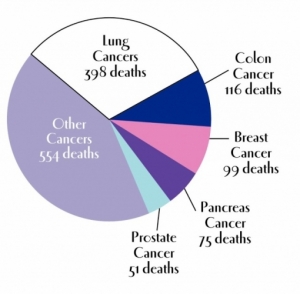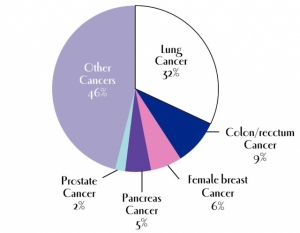Cancer edition 2017: A look at the numbers
By Rochelle Moore
Published in News on October 8, 2017 4:03 PM

News-Argus/CASEY MOZINGO
Celita Graham and Davin Madden talk about the top cancer's in Wayne County and what people can do to reduce their risk of developing cancer at the Wayne County Health Department.

News-Argus/CASEY MOZINGO
Celita Graham and Davin Madden talk about the top cancer's in Wayne County and what people can do to reduce their risk of developing cancer at the Wayne County Health Department.
Lung cancer continues to be the leading cause of cancer-related death in Wayne County, with rates that nearly double the statewide average.
From 2009 to 2013, 398 people died from lung cancer in Wayne County. During the same five-year period, 116 people died from colon cancer, 99 people from breast cancer, 75 people from pancreatic cancer and 51 from prostate cancer, according to the N.C. Center for Health Statistics.
There were also 554 deaths, in Wayne County, for other cancers, including thyroid, esophageal, leukemia, bladder and brain cancers, statistics show.
Lung cancer alone makes up 32 percent of all cancer-related deaths in the county, in 2013, the last year on record, according to the N.C. Central Cancer Registry.
"The most prevalent forms of cancer in Wayne County are lung cancer and in a distant second is colon/rectal cancer," said Davin Madden, Wayne County health director.
"Our lung cancer rates in Wayne county, all though they've gone down over the past 10 years, are still significantly higher than the state average. Matter of fact, it's almost double that.
Smoking remains more prevalent in the southeastern part of the state, which results in a higher number of lung cancer cases in Wayne County and other rural areas, Madden said.
The health department frequently provides smokers with the QuitlineNC number, at 1-800-Quit-Now, and is in the process of restarting its smoking cessation classes, said Celita Graham, health education program manager with the Wayne County Health Department.
"Lung cancer is the most preventable form of cancer because you simply quit smoking," Madden said.
Colon and rectal cancers make up a smaller amount -- 9 percent -- of all cancers in Wayne County, according to 2013 figures.
While lung cancer is the most preventable, colon cancer is the most treatable, Graham said.
Colonoscopies, typically performed on people when they reach age 50, help with the detection of cancer or pre-cancerous cells.
"The earliest you can actually detect a polyp in a colonoscopy, they can usually remove the polyp," Graham said. "If they remove it early enough, then you don't have to go through the chemo or radiation that you would in other cancers. It's the most treatable."
The early detection of cancers, through routine screening tests and by visiting a doctor regularly, can go a long way in reducing adverse outcomes.
"Early detection is really the key," Madden said. "Most cancers, when they get to certain stages are less treatable. Typically, the later stage you are and the more severity of the cancer, (there are) fewer number of options and the less chance of success in treatment.
"Making routine appointments with your provider are critical. Early detection is the best form to prevent and try to mitigate the damage of cancer."
Cancer remains the leading cause of death in Wayne County and North Carolina, since 2009, according to the Centers for Disease Control and Prevention.
While some cancers can be tied more to genetics, such as breast cancer, there are basic steps anyone can take to improve overall health. Recommendations include eating healthy foods, losing weight, increasing exercise, limiting alcohol and quitting smoking.
"That diet is tied into -- eat fresher, less processed and eat simpler foods as part of your normal routine," Madden said.
"There have been multiple studies out there that have been from reputable universities that show that a consistent level of activity of 30 minutes or more a day that elevates your heart rate has shown to release different hormones and endorphins in your body that work against cancer, work against free radicals in your body."
"You can't do anything to avoid genetic disposition but that's why we talk about limiting and reducing your risk. That's what health is about, risk reduction."


